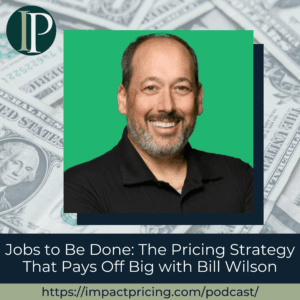Stephane Bratu leads the pricing and marketing analytics team for the e-commerce division of one of the largest distributors in the world. He developed advanced decision support systems to improve business performance and spearheaded many engagements to Fortune 500 clients in the transportation, manufacturing, distribution, and retail industries.
He also developed analytics insights to help clients improve their business decisions., as well as conducted opportunity assessments, pre-sale analysis, solution design, and implementations using advanced machine learning and optimization modeling.
In this episode, Stephane talks about the important characteristics of a pricing person, why he has to go beyond the analytics side of things, get expertise in team management, and be knowledgeable to different pricing models in order to contribute to successful pricing decisions.
Podcast: Play in new window | Download
Why you have to check out today’s podcast:
- Learn to be directionally correct in your pricing decisions
- Find out the important characteristics required to be a pricing expert
- Learn how to be creative and do different things in Pricing to know what works and what doesn’t
“There is no silver bullet in pricing. Otherwise, we would all know it.”
– Stephane Bratu
Increase Your Pricing Knowledge: Become a Champions of Value INSIDER!
To sign up go to insider.championsofvalue.com
Topics Covered:
01:10 – What led to his Pricing career
02:15 – What makes him stick with Pricing
03:37 – What got him to a VP position in Pricing
06:02 – Is analytical capability a skill necessary for a pricing person
06:44 – The need to learn management skills, and people skills aside from the analytical side of Pricing
07:21 – Why are mentors important
08:15 – What to consider when promoting people
10:20 – The advantage of him coming from a data science side of things
13:15 – People that do analytics and execute on a day-to-day basis versus those who figure out what we should do differently and execute it within the company
15:45 – Is value a key driver in analytics and how do you capture value
17:19 – Keep getting better at creating value
18:06 – His pricing advice that creates an impact in your business
18:34 – The need to get creative in getting optimal pricing
Key Takeaways:
“I realized in the past, it is very important to have mentorship that gives you a different perspective, organizes your thoughts, enables you to perform well.” – Stephane Bratu
“Value pricing is hard. It’s very hard to implement. And to capture the value is to really, really understand the business.” – Stephane Bratu
“You have to be careful in the way you price your value so that you take into consideration right where the competitor is doing. So, it’s very important in the details. You would never get it 100%. But if you move in the right direction, capture the value, that could create a competitive advantage.” – Stephane Bratu
“Value pricing is important because value is expensive. So, you need to reap the benefit of the effort that you make to create value for the customer. And if you don’t do that, you miss opportunities.” – Stephane Bratu
People / Resources Mentioned:
- Professor Peter Belobaba
Connect with Stephane Bratu:
Connect with Mark Stiving:
- Email: [email protected]
Full Interview Transcript
(Note: This transcript was created by an AI transcription service. Please forgive any transcription or grammatical errors. We probably sound better in real life.)
Stephane Bratu
There is no silver bullet in pricing. Otherwise, we would all know it.
[Intro]
Mark Stiving
Welcome to Impact Pricing, the podcast where we discuss pricing, value, and the many-faceted relationship between them. I am Mark Stiving, and today we’re on probably, episode five now of our season of Pricing Executives. And today our guest is Stephane Bratu. Here are three things you want to know about Stephane before we start, he has both a master’s degree and a Ph.D. from MIT. So, I am jealous, and he is very smart. He did a stint as a pricing scientist at both Vendavo and Zilliant, two big pricing software companies. He is currently VP of Global pricing at Digi-Key. Welcome, Stephane.
Stephane Bratu
Thank you, Mark.
Mark Stiving
Hey, how did you make that transition into pricing? How did you get into pricing?
Stephane Bratu
It’s a good question. I trained as an aerospace engineer back in France, and I was looking for a graduate program and I ended up getting accepted to MIT in Cambridge and joined the aerospace engineering company. I got interested in pricing revenue management of airlines working with Professor Peter Belobaba, who was one of the first academics of officers working on the field. It was very lucky for me to work with him – the master who discovered the world of pricing revenue management. Then I stopped with fusions engineering. And then I naturally came back, with me consulting to Vendavo and Zilliant, and then we are working in the electronic component distribution industry for Arrow, TTI and now, Digi-key.
Mark Stiving
Yeah, so why do you stay in pricing? What is it about pricing that is interesting or exciting to you?
Stephane Bratu
It is the perfect mix between analytics and strategy, right? That means an insane number of research in academia, all over the country, all over the world that focus on the pricing question. But at the same time, how do you apply them instead of these differences mean, models, and approach to a company? So that requires creative thinking. There is no silver bullet in pricing, otherwise, we would all know it, right? You have to be creative; you have to be resilient. You must be directionally correct most of the time. These are things that interest me quite a bit and I am curious by nature. I am always thinking what is so interesting about pricing is that everybody comes in to talk to you which can be an interesting perspective. You get to know the company you work for fast. And it is really fascinating to be in the center of the company.
Mark Stiving
Yeah, every department cares about what you do. So, absolutely! So, what do you think your skills were? I mean, today, you have made it all the way up to a VP of pricing. How did you do that?
Stephane Bratu
It is a good question. So, I did consult for quite a while and I was going to companies all over the world. I went to a couple of dozen companies. There are many implementing decisions per system there and I got to know the company somewhat but not as deep as I wanted. So, it was very frustrating leaving the project, going to another project, and not being able to implement all the different ideas that I had. So, one day, I decided to go in-house and was looking for an opportunity and got the opportunity to work on Arrow at a time where Arrow was pushing forward with their digital strategy. So, I was part of it, and I became a generalist of pricing specialized in this industry, which I think is perfect for what I do. A lot of products, a lot of very dynamic industries. And that for which has a big impact on pricing.
Mark Stiving
I am not sure our listeners are not familiar with the industry but for the benefit of everybody, Stephane is in the distribution of components. So, think of it as semiconductors or capacitors, resistors, things like that. And the thing is, there are thousands, possibly millions of transactions that go on a year. So, there is just so much data, even though it’s B2B. It is one of those rare B2B fields where there’s way plenty of data to go analyze. Would that be accurate, Stephane?
Stephane Bratu
That is correct, Mark. The company I currently work for, Digi-Key, we have a B2C side and the makers engineers, and we also go from the makers, engineers, all the way to the production buyers. So, the range of different customers that we serve is very wide.
Mark Stiving
So, if you are out there and you want to buy a semiconductor, you can go online and buy one from Digi-Key right now. Nice. Okay. And so, the skills that brought you up, you said, consulting got you exposed to a whole bunch of different things, but you really wanted to go deep. You wanted to learn something. And I assume that people brought you in because of your analytical capability. Can that be a reasonable statement?
Stephane Bratu
That is probably true, also my knowledge of the industry. I was lucky to have worked for the largest company in the industry, Arrow Electronics, as well as TTI, Mouser (a sort of window specialist distributor). But Mouser is the number one competitor of Digi-Key. I have been exposed, extremely fast, to another different business model within the industry.
Mark Stiving
As you move up and become an executive, did you have to learn new skills as in management skills, people skills that are different than the analytical stuff that you already had mastered?
Stephane Bratu
That is very right. I created a few teams and managed a few teams, so I had to know how to do that and a team within my team because pricing, as you know, interacts with many other teams within the company. Whether it is an asset, or sales, or accounting, or operations, these are skills that had to acquire over the years. That is especially important in my day to day job.
Mark Stiving
Yeah. And so how did you learn those skills? Did you have mentors?
Stephane Bratu
I was lucky to have a mentor here at Digi-Key. And I learned by doing, and probably not extremely well, but I learned by doing and by tracking, but I think it is important to have a mentor. That is what I realized in the past; it is very important to have mentorship that gives you a different perspective and organize your thoughts and enables you to perform well.
Mark Stiving
Yeah, absolutely. Mentors are huge in helping us think through who we are, where we need to get to, what do we need to learn, providing guidance. So, you said that you’ve got a couple of teams of people working for you now. And my favorite question, what are the characteristics of the person you are going to promote next?
Stephane Bratu
I started a few teams in my career, a team of data scientists, data analysts who support my endeavor and it takes effort in a company. So, the promotion is an excellent question. There is a difference between generating analysis once and building a system to drive decisions of the company for the long term. And that is different. The first one is interesting, but I think the second one is what is important. Do a good job. What I am doing is creating things typically, creating a different system in the environment. What I like to say is that, and you probably know, when you set a new system, it is like replacing the heart of the company, especially in the pricing field. You have got to understand the dynamics within the company to do the transplant well and keep the patient alive. In my case, I am creating groups, so I am sort of creating different paths within my group. To do that, my team is typically very small. So, what I would like to do is that one path in data science, technical science, to have a career within this field, another path, as we grow the team in management.
Mark Stiving
So, did you find it hard for you personally to learn the leadership or softer skills of the job? And by the way, I am absolutely thrilled that you came from the data science side because most people who reach executive levels didn’t come from that side.
Stephane Bratu
That is a good point, Mark. I think that companies are now realizing the benefits of scaling through systems. Probably the best example is Amazon, right? Amazon is changing a little bit in the paradigm around building a business to develop the skills in-house keys and systems to scale. So that’s kind of what leaders see and value and probably some industries are better than others, but the distribution industries should be able to promote and scale these keys.
Mark Stiving
Yeah, well, absolutely. Because there’s so much data, you have got the data science side, that should make a lot of difference. And then the question becomes, how do we move them into management and leadership? And so, I think that is pretty fascinating.
Advertisement
Let’s talk about your career. You have one boss, but you have to work with many different departments. You have great ideas, but you cannot seem to get them adopted. Face it, you want to earn a promotion. The solution could be the insider program of championsofvalue.com. For only $100 a month, you will have access to all of our online courses. You will have access to me through office hours, and you will become part of a network of peers helping each other out as well. Sure, you will learn more about pricing, but what you will really learn is pricing leadership. What does it take? How do you do it? You won’t get promoted just doing your job. Join us to learn how to become influential. Isn’t it worth $100 a month to work towards your promotion? Heck, if your company has a training budget, you can probably access that. Once you have internalized these concepts around value, you will become unique, respected, and promotable. Come join us at insider.championsofvalue.com.
Mark Stiving
One of the things I often talk to my pricing executives about is the difference between doing your job and pushing systems, changing the way the company does business. And from the description that you’ve given so far. It sounds like you rely a lot on ‘hey, we’ve got to go make major changes into systems’, and is that the type of person that you value more people that are willing to figure out what we have to do differently and then try to make that happen inside the company? Or are you valuing people who can do the analytics and essentially make sure we are executing on a day-to-day basis?
Stephane Bratu
That is an excellent question. I would say that both are important. We need to have the analytics and the right analytics to be able to quantify the value that we deliver to the customer because that’s part of the success of the company. So, creating value is expensive. And you need to monetize that and quantify that. I make sure that I always grow the company in a sustainable way. So, analytics is important. And it is always changing. There is always a new platform, new tools, new ways of thinking about it. But changing the company is also critical. It is a big organization. Everybody must be on board with the change. So, we’re working very hard and typically part of these discussions and working very hard to understand the whole definitions, understand how different groups interact, how to make the best use of the systems that they’re putting into place, and make the most of the system.
Mark Stiving
Yeah, absolutely. And I think the “we’re going to go change systems” is much, much, much harder. Absolutely. And it is tough for people to figure that out.
Stephane Bratu
Often, you have got to make the decisions and go for it. Implementing the system is potentially hard on the technical side, but also hard on the adoption and processes. At the same time, it’s up to the companies to improve change and be more competitive and improve the value proposition to their customers for a better future.
Mark Stiving
Absolutely. And those are usually where the huge returns come into play. When we are willing to take all that big effort, we usually do it because there is going to be a huge return.
Stephane Bratu
Right? Yeah.
Mark Stiving
So, Stephane I was thrilled to hear you say the word value, a minute ago, we have been talking a little bit about pricing, mostly about people and promotion and the role of pricing people. But can you help me understand when you say the word value, is that a key driver in the analytics? And what kind of variables are you using in your analytics to say this is value?
Stephane Bratu
Excellent question. Value pricing is hard. It is extremely hard to implement. And to capture the value you really need to understand the business. There are two things: one is the perceived value. That is not the value that you think there is, but the perceived value from the customer standpoint. It is understanding by the customer and the customers’ perceived value. The second thing is the competition. You might have value the same as your competitors. You must be careful in the way you price your value so that you take into consideration what the competitor is doing. It is especially important in the detail. You would never get it 100% right. But if you move in the right direction and capture the value, that could create a competitive advantage.
Mark Stiving
It is absolutely impossible to capture all the value and I often just tell people, how do you read someone’s mind to know how much they’re willing to pay for something?
Stephane Bratu
That is right.
Mark Stiving
So, there is no way we could do it on a mass scale. But we can get closer and closer. And early in the conversation, you said we need to be directionally correct. That was actually a phenomenal statement. Right? We need to get better and better every time, not just we’re not going to get optimal. We get it. Let’s get better.
Stephane Bratu
That’s right and there’s “measuring it better” and “keep getting better”. Value pricing is important because the value is expensive. To create value, it is expensive. So, you need to reap the benefit of the effort that you make to create value for the customer. And if you don’t do that, then you miss opportunities. Take the financial benefit you have that you get from the value to reinvest in growth, to invest, to create more value. And that is an important concept.
Mark Stiving
Very, absolutely. Stephane, we haven’t talked about this at all today, but I always end my podcast with the following question and so I’ve got to hit you with it. What is one piece of pricing advice that you would give our listeners that you think could have a big impact on their business?
Stephane Bratu
That is an excellent question, Mark. I would say, be creative, listen, question yourself, think differently, try things, try different things. And you would be surprised that what you may think is right, it turned out to be right after you tried it? So, it is important to me to not settle, strive for the best, and be creative.
Mark Stiving
So, I love that word, be creative. And then you said to try different things. And one of the things that often happens in companies is we are so scared to change a price or test the price, and we never change anything then we don’t know what works and what doesn’t work.
Stephane Bratu
That is right. And then you end up in your comfort zone that might not be so comfortable especially if it is a very volatile time for which companies have to take risks and try things and get better. Otherwise, your competitors are going to get better before you and that makes a negative impact.
Mark Stiving
Now, that might be a really good way to say it: we need to get better, faster than our competition is getting better.
Stephane Bratu
Yeah. And creativity is, but it is key. So, it is interesting that you think that Data Science, is very rational. It is very data-driven, which is true, but at the same time, you need to think outside the box and be creative, right?
Mark Stiving
Yep, absolutely. The numbers can only tell you what models you put in. Alright, Stephane. Thank you so much for your time today. I’ve really enjoyed this conversation. If anybody wants to contact you, how can they do that?
Stephane Bratu
You’re welcome to contact me on LinkedIn.
Mark Stiving
Okay, excellent. And we will have your name spelled correctly in the show notes so that people can find you on LinkedIn. We appreciate that. Episode 86, all finished. Nice! To our listeners, would you please leave us a review? These are very, very valuable to us. Recently, Tae647 left a review that said,
“Great podcast! Mark is a seasoned host and asked insightful questions to his guests. Highly recommend listening!”
Thank you very much, Tae. Also, please don’t forget to join our communityofchampionsofvalue.com. That is where we publish all of our free content, you have access to it. So, you will see the blogs, the videos, the podcasts, the memes. So, go to community.championsofvalue.com. If you have any questions or comments about the podcast or about pricing, feel free to email me [email protected]. Now, go make an impact!
Tags: Accelerate Your Subscription Business, ask a pricing expert, pricing metrics, pricing strategy














